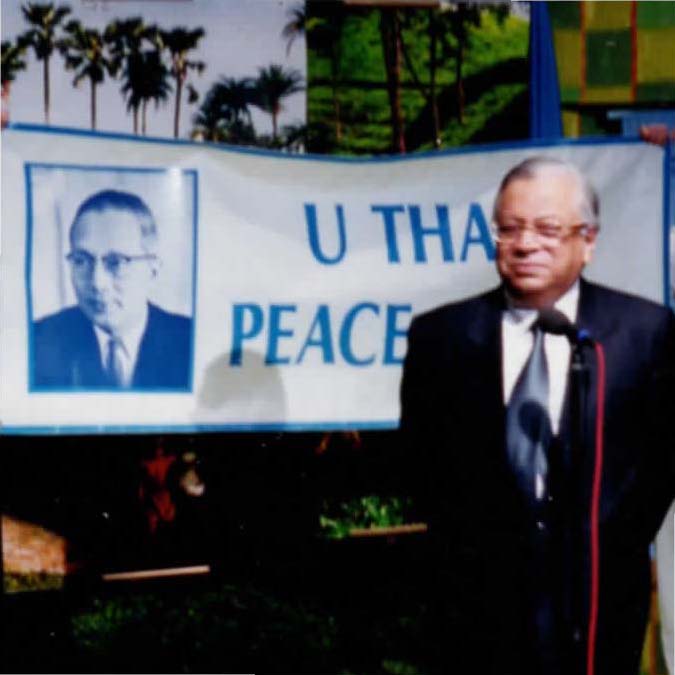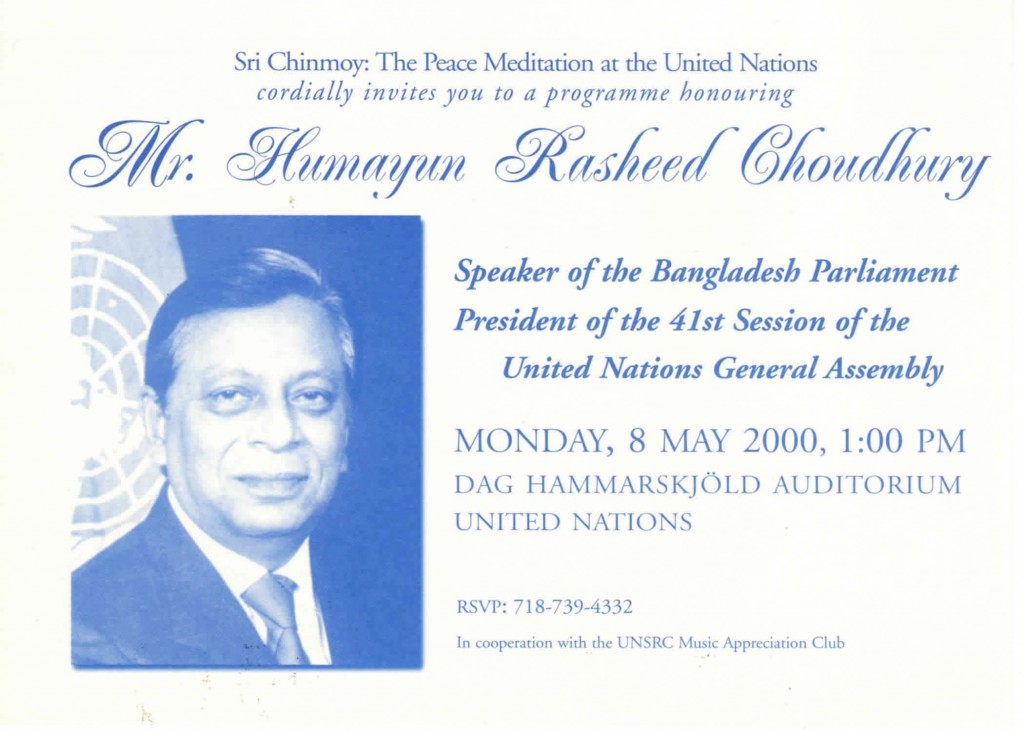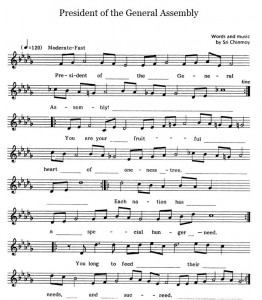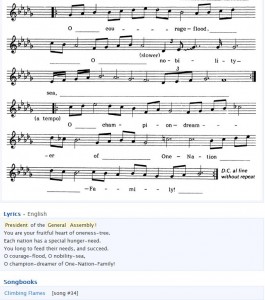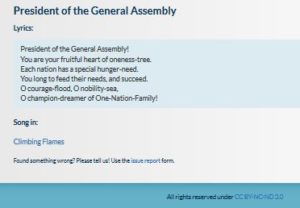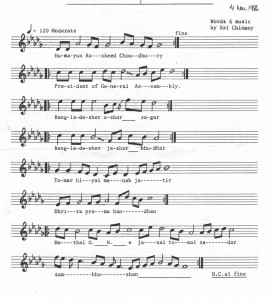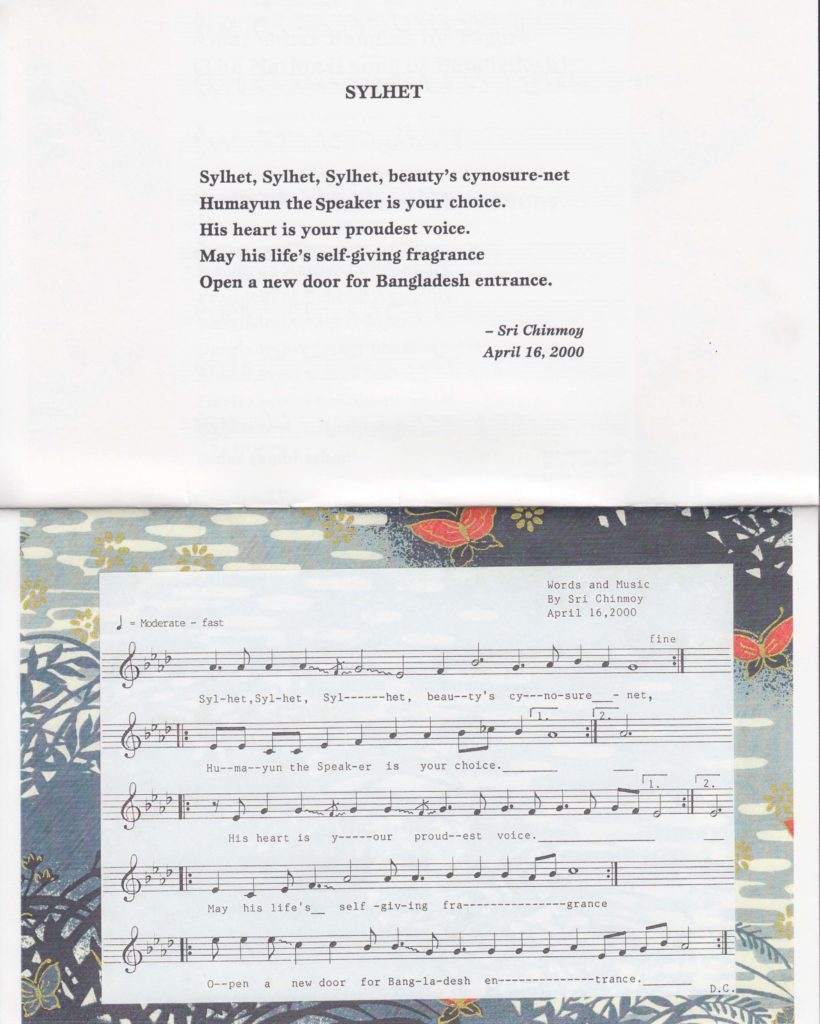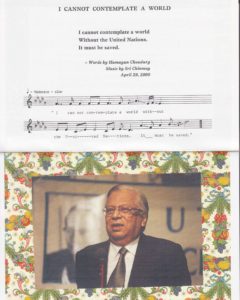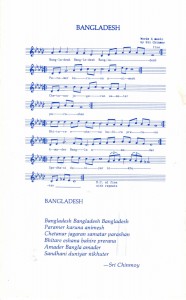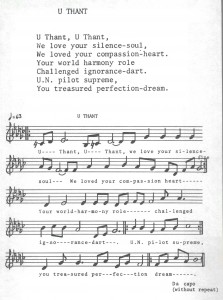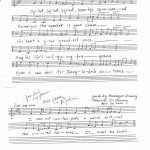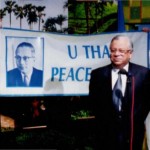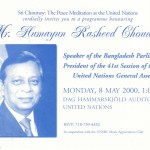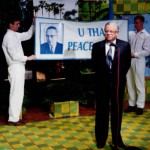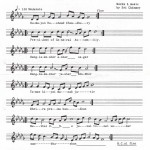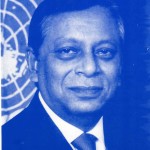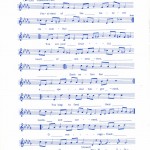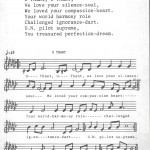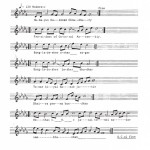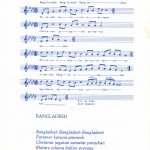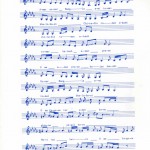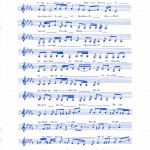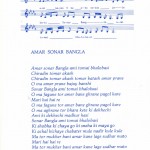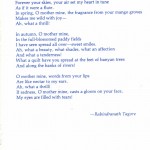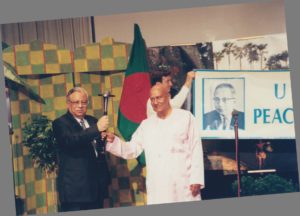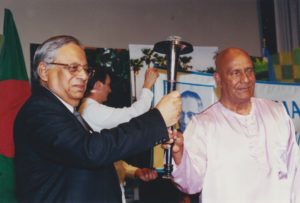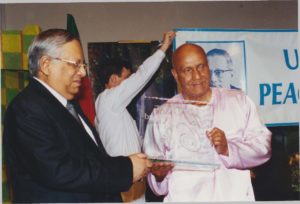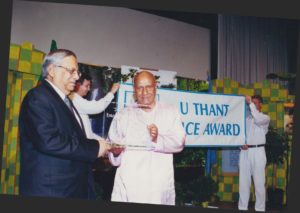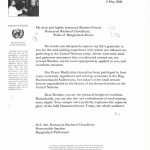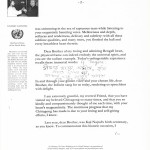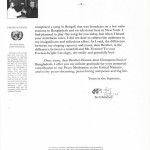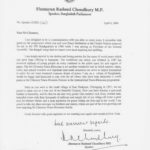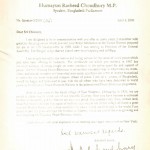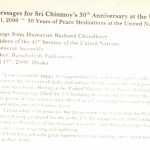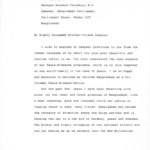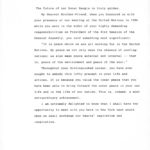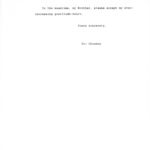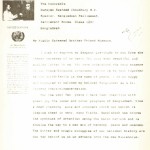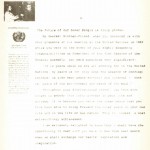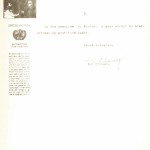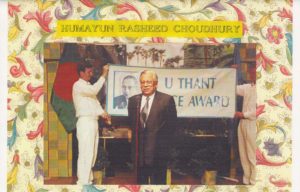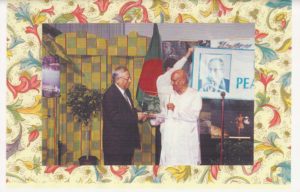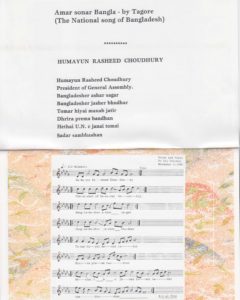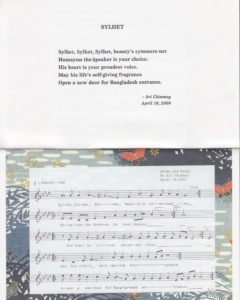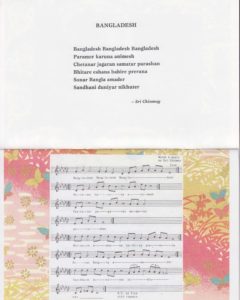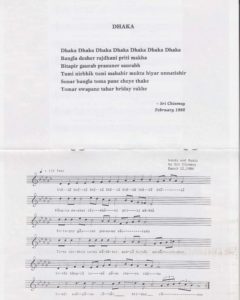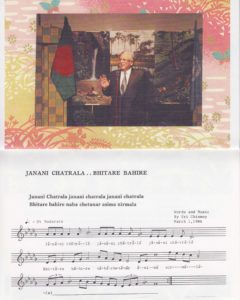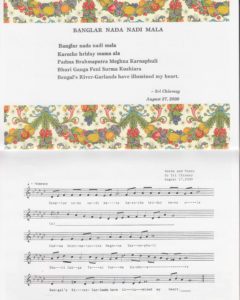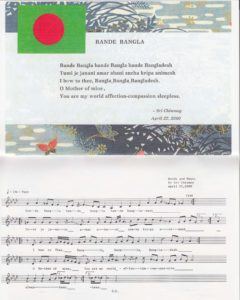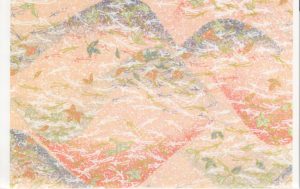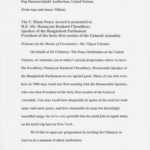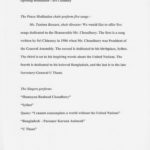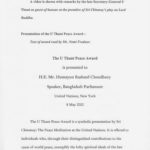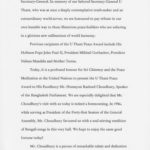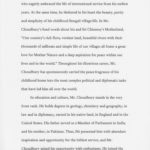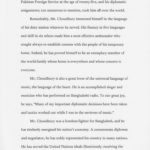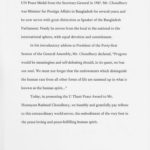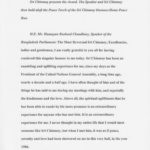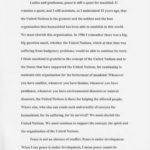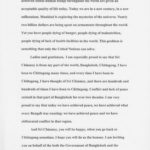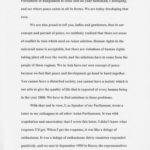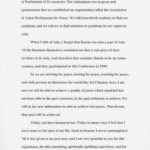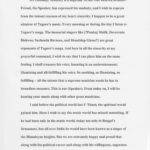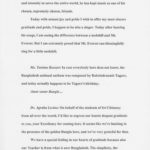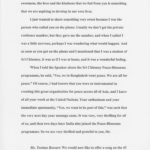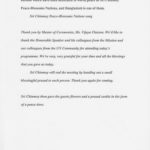U Thant Award H.R.Choudhury; Pres 41 UNGA; Speaker Bangladesh Parliament, 2000 May 08
Filed under asia-oceana | Music and Songs | U Thant Peace AwardU Thant Peace Award presented to Mr. Humayun Rasheed Choudhury,
President of the 41st Session of the UN General Assembly and
Speaker of the Bangladesh Parliament – 8 May 2000
Sri Chinmoy: The Peace Meditation at the United Nations cordially invites you to a programme honouring
Speaker of the Bangladesh Parliament
President of the 41st Session of the United Nations General Assembly
MONDAY, 8 MAY 2000, 1:00 PM DAG HAMMARSKJOLD AUDITORIUM !
In cooperation with the UNSRC Music Appreciation Club
8 May 2000 Dag Hammarskjold Auditorium, United Nations
The U Thant Peace Award is presented to H.E. Mr. Humayun Rasheed Choudhury Speaker of the Bangladesh Parliament President of the forty-first session of the General Assembly
Programme Items as noted in detail below:
Welcome by the Master of Ceremonies – Ms. Vijaya Claxton:
Opening meditation – Sri Chinmoy
The Peace Meditation choir perform five songs
- The first is a song written by Sri Chinmoy in 1986 when Mr. Choudhury was President of the General Assembly.
- The second is dedicated to his birthplace, Sylhet.
- The third is set to his inspiring words about the United Nations.
- The fourth is dedicated to his beloved Bangladesh, and
- the last is to the late ~ Secretary-General U Thant.
A video is shown – with remarks by the late Secretary-General U Thant
Introduction to Presentation of the U Thant Peace Award
Sri Chinmoy presents the Award.
The Speaker and Sri Chinmoy hold aloft the Peace Torch
H.E. Mr. Humayun Rasheed Choudhury, Speaker of the Bangladesh Parliament:
A recording of Mr. Choudhury singing two Bengali songs is played.
Sri Chinmoy comments
Bangladesh national anthem “Amar sonar Bangla” composed by Rabrindranath Tagore
Dr. Agraha Levine: on behalf of the students of Sri Chinmoy from all over the world
Sri Chinmoy Peace-Blossoms Nations song performed by Choir
Thank you by Master of Ceremonies,
Sri Chinmoy then gave the guests flowers and a prasad cookie in the form of a peace dove. – – –
Programme Details:
Welcome by the Master of Ceremonies – Ms. Vijaya Claxton:
On behalf of Sri Chinmoy: The Peace Meditation at the United Nations, we welcome you to today’s special programme where we have His Excellency Humayun Rasheed Choudhury, Honourable Speaker of the Bangladesh Parliament as our special guest.
Many of you who were here in 1986 may recall our first meeting with the Honourable Speaker, who was then President of the forty-first session of the General Assembly.
Link to 1986 event: President of G.A. Humayun Rasheed Choudhury, Honoured 1986 Nov 04:t
You may recall how eloquently he spoke of the need for both inner and outer peace, and how eloquently he sang two hauntingly beautiful songs. So we’re very grateful that he could join us again today on his brief trip here in New York.
We’d like to open our programme by inviting Sri Chinmoy to lead us in a moment of silent meditation.
Opening meditation – Sri Chinmoy
The Peace Meditation choir perform five songs
Ms. Tanima Bossart, choir leader:
We would like to offer five songs dedicated to the Honourable Mr. Choudhury.
- The first is a song written by Sri Chinmoy in 1986 when Mr. Choudhury was President of the General Assembly.
- The second is dedicated to his birthplace, Sylhet.
- The third is set to his inspiring words about the United Nations.
- The fourth is dedicated to his beloved Bangladesh, and
- the last is to the late ~ Secretary-General U Thant.
The Singers perform:
- President of the General Assembly
- Quote: “I cannot contemplate a world without the United Nations”
A video is shown
with remarks by the late Secretary-General U Thant as guest of honour at the premiere of Sri Chinmoy’s play on Lord Buddha 1973.
Presentation of the U Thant Peace Award
Text of award read by Ms. Nemi Fredner:
The U Thant Peace Award
is presented to
H.E. Mr. Humayun Rasheed Choudhury
Speaker, Bangladesh Parliament
United Nations, New York 8 May 2000
The U Thant Peace Award is a symbolic presentation by Sri Chinmoy: The Peace Meditation at the United Nations. It is offered to individuals who, through their distinguished contributions to the cause of world peace, exemplify the lofty spiritual ideals of the late I 8 May 2000 4 j 1- Secretary-General. In memory of our beloved Secretary-General U f Thant, who was at once a deeply contemplative truth-seeker and an extraordinary world-server, we are honoured to pay tribute in our own humble way to those illustrious peace-builders who are ushering in a glorious new millennium of world harmony.
Previous recipients of the U Thant Peace Award include His Holiness Pope John Paul II, President Mikhail Gorbachev, President Nelson Mandela and Mother Teresa.
Today, it is a profound honour for Sri Chinmoy and the Peace Meditation at the United Nations to present the U Thant Peace Award to His Excellency Mr. Humayun Rasheed Choudhury, Speaker of the Bangladesh Parliament. We are especially delighted that Mr. Choudhury’s visit with us today is indeed a homecoming. In 1986, while serving as President of the Forty-first Session of the General Assembly, Mr. Choudhury favoured us with a soul-stirring rendition of Bengali songs in this very hall. We hope to enjoy the same good fortune today!
Mr. Choudhury is a person of remarkable talent and dedication who eagerly embraced the life of international service from his earliest years. At the same time, he sheltered in his heart the beauty, purity and simplicity of his childhood Bengali village-life. In Mr. Choudhury’s fond words about his and Sri Chinmoy’s Motherland, “Our country’s rich flora, verdant land, beautiful rivers with their thousands of sailboats and simple life of our villages all foster a great love for Mother Nature and a deep aspiration for peace within our lives and in the world.” Throughout his illustrious career, Mr. Choudhury has spontaneously carried the peace-fragrance of his childhood home into the most complex political and diplomatic tasks that have led him all over the world.
In education and culture, Mr. Choudhury stands in the very front rank. He holds degrees in geology, chemistry and geography, in law and in diplomacy, earned in his native land, in England and in the United States. His father served as a Member of Parliament in India, and his mother, in Pakistan. Thus, life presented him with abundant inspiration and opportunity for the loftiest service, and Mr. Choudhury seized his opportunity with enthusiasm. He joined the 8 May 2000 6/ t Pakistan Foreign Service at the age of twenty-five, and his diplomatic assignments, too numerous to mention, took him all over the world.
Remarkably, Mr. Choudhury immersed himself in the language of his duty station wherever he served. His fluency in five languages and skill in six others made him a most effective ambassador who sought always to establish oneness with the people of his temporary home. Indeed, he has proved himself to be an exemplary member of the world-family whose home is everywhere and whose concern is everyone.
Mr. Choudhury is also a great lover of the universal language of music, the language of the heart. He is an accomplished singer and musician who has performed on Bangladeshi radio. To our great joy, he says, “Many of my important diplomatic decisions have been taken and tactics worked out while I was in the environs of music.”
Mr. Choudhury was a freedom-fighter for Bangladesh, and he has tirelessly energised his nation’s economy. A consummate diplomat and negotiator, he has nobly represented his country in many nations. He has served the United Nations ideals illustriously, receiving the UN Peace Medal from the Secretary-General in 1987. Mr. Choudhury was Minister for Foreign Affairs in Bangladesh for several years; and he now serves with great distinction as Speaker of the Bangladesh Parliament. Freely he moves from the local to the national to the international sphere, with equal devotion and commitment.
In his introductory address as President of the Forty-first Session of the General Assembly, Mr. Choudhury declared, “Progress would be meaningless and self-defeating should, in its quest, we lose our soul. We must not forget that the endowments which distinguish the human race from all other forms of life are summed up in what is known as the human spirit … “
Today, in presenting the U Thant Peace Award to Mr. Humayun Rasheed Choudhury, we humbly and gratefully pay tribute to this extraordinary world-server, the embodiment of the very best in the peace-loving and peace-fulfilling human spirit.
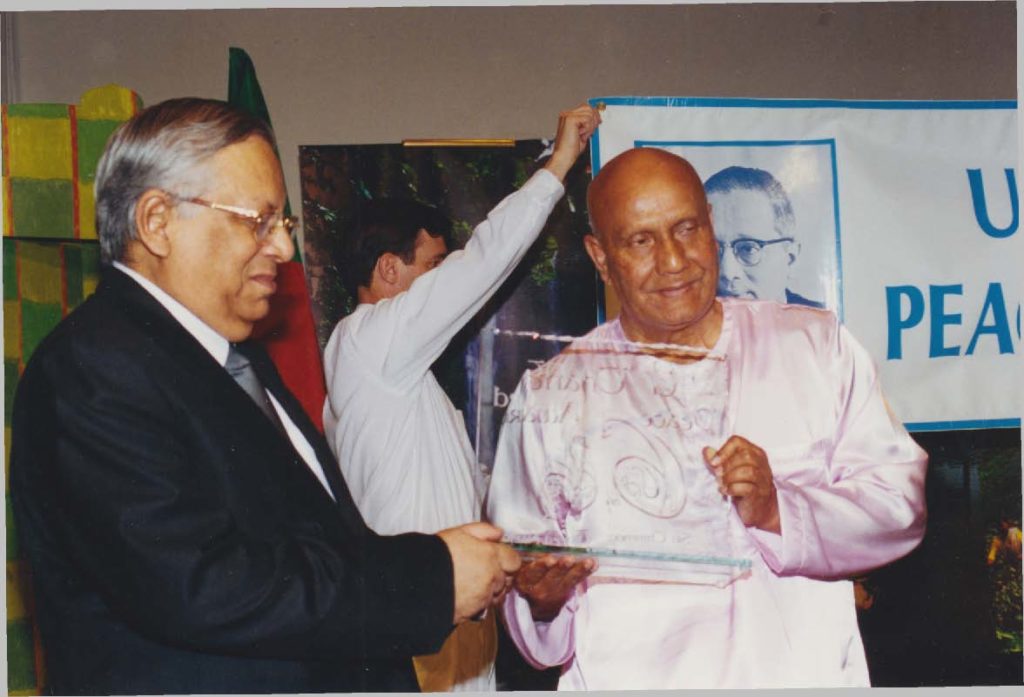 Sri Chinmoy presents the Award.
Sri Chinmoy presents the Award.
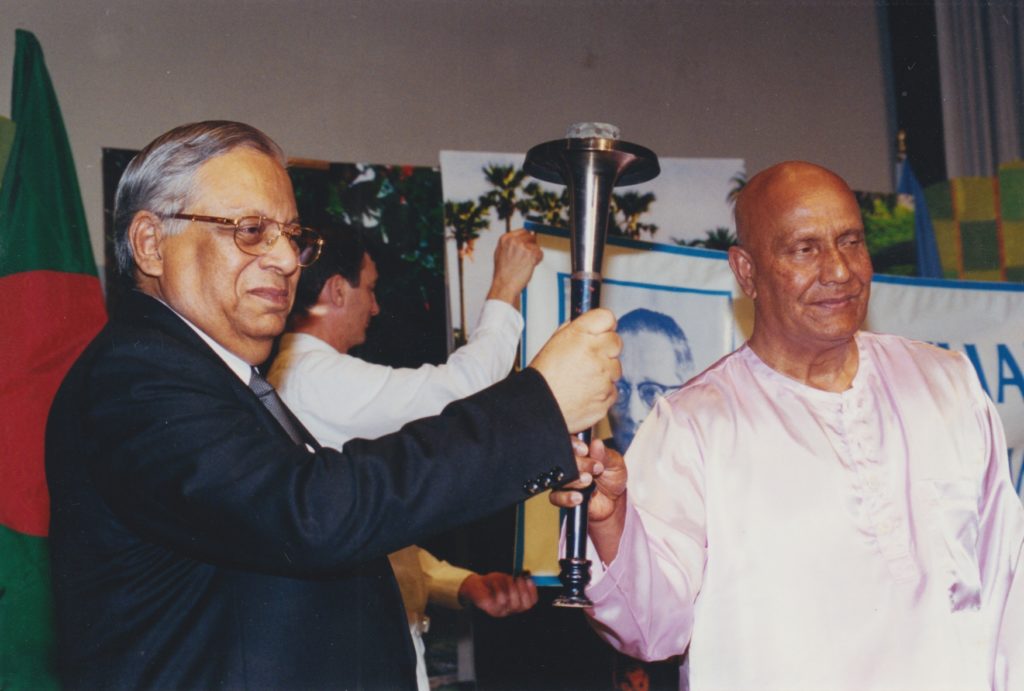 The Speaker and Sri Chinmoy then hold aloft the Peace Torch
The Speaker and Sri Chinmoy then hold aloft the Peace Torch
of the Sri Chinmoy Oneness-Home Peace Run.
H.E. Mr. Humayun Rasheed Choudhury, Speaker of the Bangladesh Parliament:
The Most Reverend Sri Chinmoy, Excellencies, ladies and gentlemen, I am really grateful to you all for having rendered this singular honour to me today. Sri Chinmoy has been an ennobling and uplifting experience for me, since my days as the President of the United Nations General Assembly, a long time ago, nearly a decade and a half ago. I have often thought of him and of the things he has said to me during my meetings with him, and especially the kindnesses and the love. Above all, the spiritual upliftment that he has been able to exude by his mere presence is an extraordinary experience for anyone who has met him. It is an extraordinary experience for me. I never thought in my entire life that I would meet someone like Sri Chinmoy, but when I met him, it was as if peace, serenity and love had been showered on me in this very hall, in the year 1986.
Ladies and gentlemen, peace is still a quest for mankind. It remains a quest, and I still maintain, as I maintained 25 years ago, that the United Nations is the greatest and the noblest and the best organisation that humankind has been able to establish in this world. We must cherish this organisation. In 1986 I remember there was a big, big question mark, whether the United Nations, which at that time was suffering from budgetary problems, would be able to continue its work. I think mankind is grateful to the concept of the United Nations and to the States that have supported the United Nations, for continuing to maintain this organisation for the betterment of mankind. Whenever you have conflict, whenever you have famine, whenever you have pestilence, whenever you have environmental disasters or natural disasters, the United Nations is there for helping the affected people. Where else, who else can exude such universality of concern for humankind, for its suffering, for its survival? We must cherish the United Nations. We must continue to support the concept, the spirit and the organisation of the United Nations.
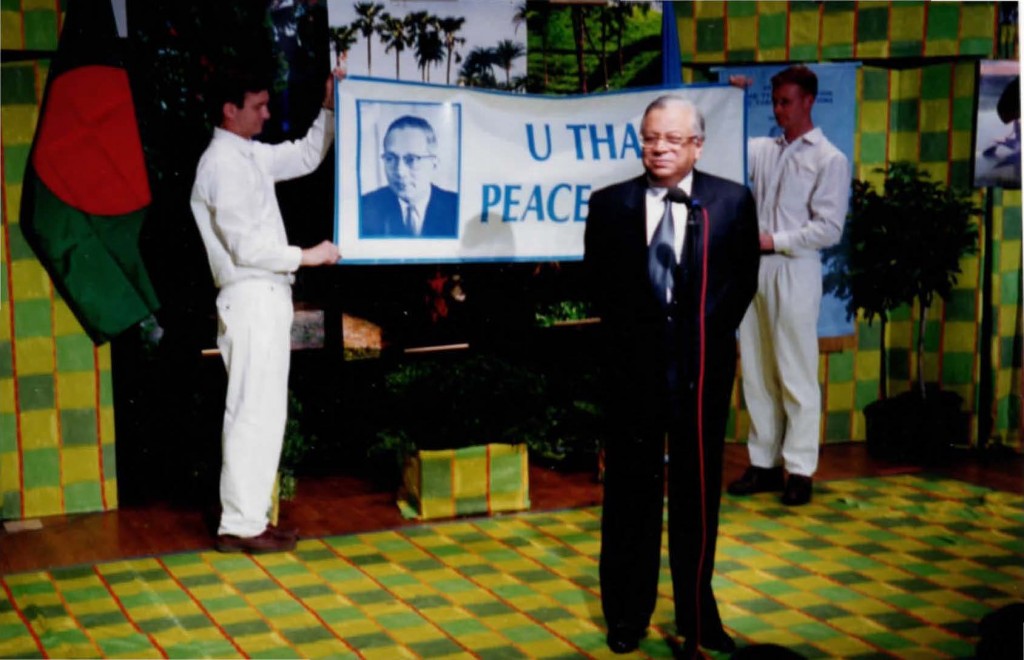 Peace is not an absence of conflict. Peace is under development. When I say peace is under development, I mean peace cannot be 8 May 2000 achieved unless human beings throughout the world are given an acceptable quality of life today. Today we are in a new century, in a new millennium. Mankind is exploring the mysteries of the universe. Nearly two billion dollars are being spent on armaments throughout the world. Yet you have people dying of hunger, people dying of malnutrition, people dying of lack of health facilities in the world. This problem is something that only the United Nations can solve.
Peace is not an absence of conflict. Peace is under development. When I say peace is under development, I mean peace cannot be 8 May 2000 achieved unless human beings throughout the world are given an acceptable quality of life today. Today we are in a new century, in a new millennium. Mankind is exploring the mysteries of the universe. Nearly two billion dollars are being spent on armaments throughout the world. Yet you have people dying of hunger, people dying of malnutrition, people dying of lack of health facilities in the world. This problem is something that only the United Nations can solve.
Ladies and gentlemen, I am especially proud to say that Sri Chinmoy is from my part of the world, Bangladesh, Chittagong. I have been to Chittagong many times, and every time I have been to Chittagong, I have thought of Sri Chinmoy, and there are hundreds and hundreds of times I have been to Chittagong. Conflict and lack of peace existed in that part of Bangladesh for over two decades. I am very proud to say that today we have achieved peace, we have achieved what every Bengali was wanting: we have achieved peace and we have obliterated conflict in that region. And Sri Chinmoy, you will be happy, when you go back to Chittagong sometime. I hope you will do us the honour. I am inviting you on behalf of the both the Government of Bangladesh and the Parliament of Bangladesh to come and see your homeland, Chittagong, and see where peace exists in all its forms. We are today developing that area.
We are also proud to tell you, ladies and gentlemen, that in our concept and pursuit of peace, we suddenly realised that there are areas of conflict in Asia which need an Asian solution. Human rights in the universal sense is acceptable, but there are violations of human rights taking place all over the world, and the solutions have to come from the people of those regions. We in Asia have our own concept of peace because we feel that peace and development go hand in hand together. You cannot have a disturbed society, you cannot have a society which is not able to give the quality of life that is expected of every human being in the year 2000. We have to find solutions to these problems. With that end in view, I, as Speaker of my Parliament, wrote a letter to my colleagues in all other Asian Parliaments. It was with trepidation and uncertainty that I wrote this letter. I didn’t know what response I’d get. When I got the response, it was like a deluge of enthusiasm. It was a deluge of enthusiasm: thirty countries responded positively, and we met in September 1999 in Dacca, the representatives Parliament of 31 countries. The enthusiasm was so great and spontaneous that we established an organisation called the Association of Asian Parliaments for Peace. We will henceforth continue to find our solutions, and we will try to find solutions to problems in our region in Asia.
When I talk of Asia, I forgot that Russia was also a part of Asia until the Russians themselves reminded me that a vast piece of their territory is in Asia. And therefore they consider Russia to be an Asian country, and they participated in this Conference in 1999.
So we are striving for peace, looking for peace, working for peace, and with persons to illuminate the world like Sri Chinmoy here, I am sure we will be able to achieve a quality of peace which mankind has not been able in the past centuries, in the past millennia to achieve. We will in the new millennium be able to achieve that peace. That dream, that goal will be achieved.
Today you have honoured me. Today in many ways I feel that I have come to the apex of my life. Such an honour I never contemplated until it was given to me just now, and I am very grateful to you for this experience, for this ennobling, spiritually uplifting experience, and for the honour that you have bestowed on me.
Thank you very, very much.
The Speaker received a standing ovation.
Most esteemed Sri Chinmoy, ladies and gentlemen, in the citation for the award given to me, it has been mentioned that I did walk in the realm of music, and I was a practising singer ’til about 1990s. Now I am 71 years old, and our type of songs need holding of breathe, so I cannot hold the breath as much as I was able to do. But fortunately about 10 years ago I had recorded some of my songs. I have brought two songs for Sri Chinmoy. They are ten years old, and it is for you to judge whether I was a good singer or a tolerable singer or a bad singer. Thank you very much.
A recording of Mr. Choudhury singing two Bengali songs is played.
Tumi ki ke balicho …
Ami tomai jato
Sri Chinmoy:
Modesty is a supreme virtue. Our beloved Brother- Friend, the Speaker, has expressed his modesty, and I wish to express from the inmost recesses of my heart, sincerity. I happen to be a great admirer of Tagore’s music. Every morning or during the day I listen to Tagore’s songs. The immortal singers like [?Pankaj Malik, Devavrata Bishwas, Sachenda Borman, and Shantidep Ghose?] are great exponents of Tagore’s songs. And here in all the sincerity at my prayerful command, I wish to say that I can place him on the same footing. I shall treasure his voice, haunting is an understatement; illumining and all-fulfilling his voice. So soothing, so illumining, so fulfilling – all the talents that a supreme musician needs he has in boundless measure. This is our (Speaker). From today on, I will be hearing your music along with other great musicians.
I said before the political world lost U Thant; the spiritual world gained him. Here I wish to say the music world has missed something. If he had been only in the music world, today not only in Bengal’s firmament, but all over India he would have been known as a singer of the Himalayan heights. But we are extremely happy and proud that along with his political career and along with his willingness, eagerness and intensity to serve the entire world, he has kept music as one of his chosen, supremely chosen, friends.
Today with utmost joy and pride I wish to offer my most sincere gratitude and pride. I happen to be also a singer. Today after hearing his songs, I am seeing the difference between a molehill and Mt. Everest. But I am extremely proud that Mt. Everest can blessingfully sing for a little molehill.
Ms. Tanima Bossart:
In case everybody here does not know, the Bangladesh national anthem was composed by Rabrindranath Tagore, and today actually happens to be Tagore’s birthday.
Amar sonar Bangla …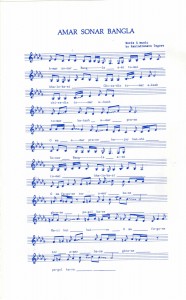
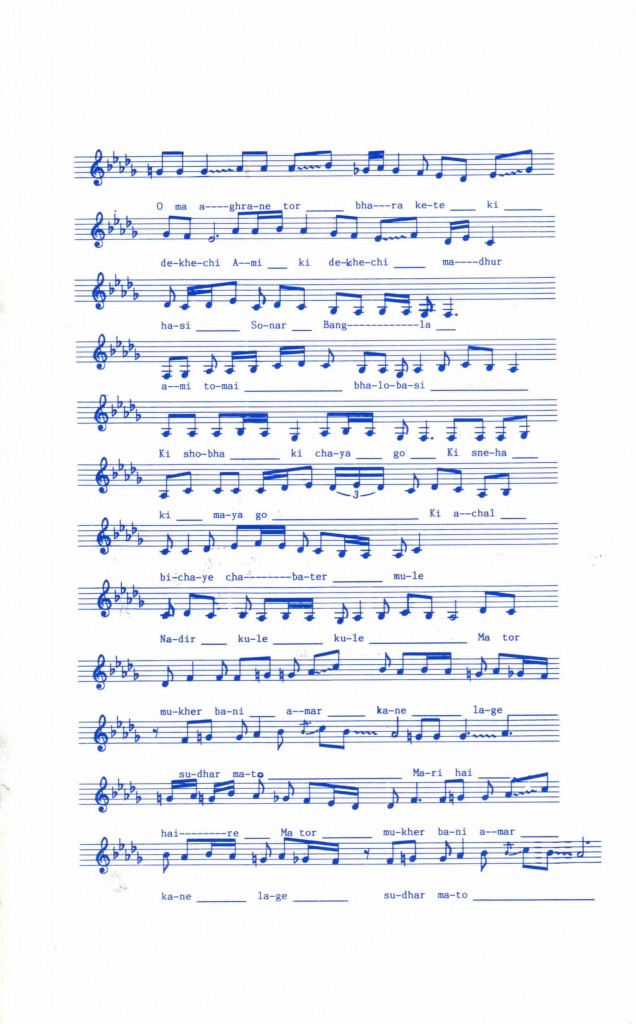
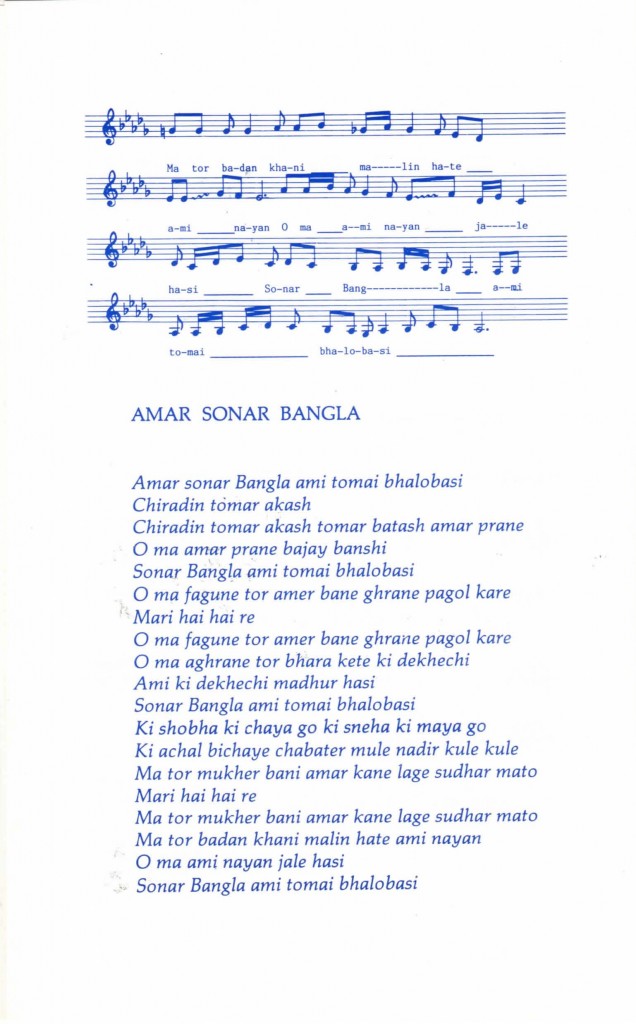
Dr. Agraha Levine:
On behalf of the students of Sri Chinmoy from all over the world, I’d like to express our hearts deepest gratitude to you, your Excellency for coming here. It seems like we’re basking in the presence of the golden Bangla here, and we’re very grateful for that.
We have a special feeling in our hearts of gratitude because also our Teacher is from what is now Bangladesh. The simplicity, the 8 May 2000 16 sweetness, the love and the kindness that we feel from you is something that we are aspiring to develop in our own lives.
I just wanted to share something very sweet because I was the person who called you on the phone. Usually we don’t get the private residence number, but they gave me the number, and when I called I was a little nervous, perhaps I was wondering what would happen. And as soon as you got on the phone and I mentioned that I was a student of Sri Chinmoy, it was as if I was at home, and it was a wonderful feeling.
When I told the Speaker about the Sri Chinmoy Peace-Blossoms programme, he said, “Yes, we in Bangladesh want peace. We are aU for peace.” Of course, I had known that you were so instrumental in creating this great organisation for peace across all of Asia, and I knew of all your work at the United Nations. Your enthusiasm and your immediate spontaneity, “Yes, we want to be part of this,” was such that the very next day your message came. It was very, very thrilling for all of us, and then two days later India also joined the Peace-Blossoms programme. So we are very thrilled and grateful to you, Sir.
Ms. Tanima Bossart:
We would now like to offer a song on the 43 nations which have been dedicated to world peace as Sri Chinmoy Peace-Blossoms Nations, and Bangladesh is one of them.
Sri Chinmoy Peace-Blossoms Nations song
Thank you by Master of Ceremonies, Ms. Vijaya Claxton:
We’d like to thank the Honorable Speaker and his colleagues from the Mission and our colleagues from the UN Community for attending today’s programme. We’re very, very grateful for your time and all the blessings that you gave us today.
Sri Chinmoy will end the meeting by handing out a small blessingful prasad to each person. Thank you again for coming.
Sri Chinmoy then gave the guests flowers and a prasad cookie in the form of a peace dove. – – –
More Photos to be added as available:
Click on image below for larger or different resolution Photo – Image:
Gallery 1:
Initial Photos and songs (see gallery 3 for song book format):
Gallery 2:
Additional Photos:
Gallery 3:
Some background correspondence before and after event:
Gallery 4 :
Song book
Gallery 5:
jpg format page-images of Transcript of event
Download PDF:
- 1986-11-nov-04-pres-unga-Humayun-rasheed-choudhury-song-by-ckg-ocr
- 2000-05-may-08-uthant-award-choudhury-bangladesh-transcript-ocr
- 2000-05-may-08-uthant-award-choudhury-bangladesh-linvite-photo-0cr
- 2000-05-may-08-choudhury-words-song-SULHET-bangladesh-ckg
- 2000-05-may-08-uthant-award-choudhury-bangladesh-letter-from-ckg-ocr
- 2000-05-may-08-choudhury-bangladesh-correspondance-faded-cropped
- songbook-Humayun Rasheed Choudhury
